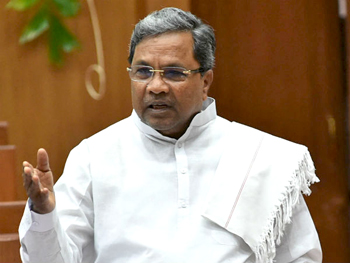Bengaluru, Jul 10: The Karnataka cabinet gave its approval for "The Karnataka Contingency Fund (Amendment) Bill, 2020" to enhance the contingency fund limit to Rs 500 crore in the wake of the COVID-19 pandemic.
This will be an ordinance making one time enhancement in the limit as the government needs money to make payments immediately, Law and Parliamentary Affairs Minister JC Madhuswamy told reporters after a cabinet meeting.
Under the contingency fund, the government had room to spend up to Rs 80 crore without budget provision.
"...but this time due to COVID-19 as we had to give money to some sections that were in distress like barbers, flower and vegetable growers, taxi drivers, among others, we have decided to increase the limit to Rs 500 crore," Mr Madhuswamy said.
"As assembly was not in session and as we had to make payments to those in distress immediately, this decision has been taken," he added.
The cabinet today ratified the administrative approval given to carry out civil and electrical works to install medical gas pipeline with high flow oxygen system at district hospitals, taluk and community health centres coming under Health and Family welfare department in view of COVID-19.
The minister said about Rs 207 crore is being approved for this purpose.
It also ratified procurement of medical equipment and furniture for public healthcare institutions of the health and family welfare department worth Rs 81.99 crore.
According to the minister, the cabinet has decided to bring in an amendment to section 9 of the Lokayukta act, which mandates that the preliminary inquiry contemplated by Lokayukta or Upalokayuta should be completed in 90 days and charge sheeting should be completed within six months.
Noting that at the Agricultural Produce Market Committee (APMC) cess was being collected, he said as the government had brought in an amendment to the APMC act, there was demand to reduce the market cess. "So we have reduced it from 1.5 per cent to one per cent."
Approval has also been given by the cabinet to bring Karnataka Vidyuth Kharkane (KAVIKA) and Mysore Electrical Industries (MEI), which are presently under the control of Commerce and Industries department, under administrative control of the energy department.
Other decisions taken by the cabibinet include deployment and implementation of "e-procurement 2.0" project on PPP at a cost of Rs 184.37 crore and ratification of the action taken to issue orders on March 24 to release interest free loan of Rs 2,500 crore to ESCOMs for payment of outstanding power purchase dues to generating companies.
The cabinet also gave administrative approval for setting up of an Indian Institute of Information technology at Raichur.
"Under this, we are committed to provide Rs 44.8 crore in four years for infrastructure," the minister added.
 Taking a swipe at Modi for failing to bring back black money and for implementing demonetisation, Siddaramaiah termed the Modi government the most corrupt one. “Demonetisation is a big failure. More than 100 people have died trying to withdraw their own money standing in queues (in front of banks). Congress will launch a massive movement against demonetisation,” he said.
Taking a swipe at Modi for failing to bring back black money and for implementing demonetisation, Siddaramaiah termed the Modi government the most corrupt one. “Demonetisation is a big failure. More than 100 people have died trying to withdraw their own money standing in queues (in front of banks). Congress will launch a massive movement against demonetisation,” he said.



Comments
Do not call Note bandi as a failure .. It is required to check the bloody corrupt politicians .....Instead of talking in the air collect the information on black money of Modi or BJP leaders and pass it on IT officials , and make it public...
It is impotent Cong which brought Modi to such a position .... You reap what you sow.....If your previous cong govts were quick to take actions against the goondas of sangh Parivar in earlier days, we would not have seen such days ..... NO USE OF CRYING ON SPLIT MILK ....
hobalt watch yellintu siddu, ninu corrupt alva?
Add new comment